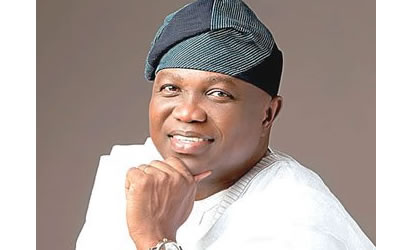Having satisfied the necessary requirements by property owners whose lands were revoked based on perceived overriding public interest, Lagos Land Bureau has said it paid a sum of N2,022 billion to individuals and families, while it generated N20.7 billion between 2016 and 2017.
Speaking at the commemoration of second year of Governor Akinwunmi Ambode’s administration in office last week, Special Adviser, Urban Development, Mrs Yetunde Onabule, stated that the administration has shown commitment to increasing the gross domestic product (GDP) of the state and actualising a seamless means of doing business in Lagos.
Giving the financial report, Onabule noted that in spite of the challenging financial crisis in the country, the bureau’s gross earnings in the year under review was put at N20.7 billion.
“The revenue performance which considerably surpassed the total revenue of the previous year by N11.5 billion was due to a transaction on the sales of land for industrial development in the state,” she said, adding that the revenue performance for the year under consideration exceeded the bureau’s budget for the period by 45 per cent.
According to her, asides the one-off transaction expected revenue from the new schemes during the period, land as a resource is desirable and crucial to every individual.
“Against this backdrop and in line with the governor’s articulated vision for the state that the Land Bureau is the second highest revenue earner in the state, we have strived to create a synergy between our operations and the genuine initiative of the government.
On the reforms taking place so far, Onabule noted that Land Bureau has significantly improved on its services “as now more than ever, Lagosians are deserving of knowing our modest achievements and how we have better repositioned land resource in the state to their benefit and in response to the demands of a 21st century mega city that Lagos State has become.
“As a result, this administration in full appreciation of the role the bureau plays in its drive to rapid urbanisation of the state has put in place effective and dynamic reforms to continuously ease the process of land administration in the state, as government has put in place reforms to continuously ease the processes within the Land Bureau and its sister agencies: Office of the State Surveyor General (OSSG) and New Towns Development Authority (NTDA).
“Let me make it abundantly clear that the governor is passionate about obtaining Certificate of Occupancy with ease in the present cosmopolitan state of Lagos. As such, he had signed cumulatively, since the inception of his administration, a total of 4,445 Electronic Certificates of Occupancy (E-C of O).
“It is worthy to state that when land is acquired and title revoked for over-riding public interest, it is our duty and obligation, as a responsible and responsive government, to pay compensation.
“However, payment of compensation must be with the presentation of all necessary documents as may be required, evidencing ownership of the land. We have not relented in our efforts to pay compensation. We have paid and shall continue to pay compensation to all affected persons/groups in this regard.
“Furthermore, individuals or groups are given alternative land in lieu of monetary compensation. Beneficiaries of compensation include: Abule Egba Link Bridge, N752 million; Oko Baba Sawmill Relocation, N39,05 million; Isale Igangan Regeneration Project N351 million; Olorunsogo Market (Shops), N447.324 million; Mosafejo Community/Olorunsogo Ultra-Modern Market, N118,4 million and Epe (road expansion) Phase1, N316 million respectively.”
In a related development, it was stated that Lagos revenue projections of N30 billion monthly in 2017 and N50 billion in 2018 will be aimed at, providing key infrastructure needed in the transformation of the state into the desirous third largest global economic financial hub and Africa’s model.
This was declared by the Commissioner for the Ministry of Economic Planning and Budget, Mr Akinyemi Ashade, during a press conference organised to give the stewardship of his ministry’s activities and achievements in the last one year. His accounts at the event were also confirmed in a statement signed by the ministry’s Director of Public Affairs, Mrs Olubunmi Olowu-Adekoya and made available to Nigerian Tribune.
He assured that the ministry would continue to manage the economy of the state through prudent and stringent management of available resources as well as deploying international best practice models and reforms for effective mobilisation, planning.
While stating the performance rate, of the state’s 2016 budget, the commissioner revealed that the sum of N291 billion was expended on infrastructural development in the year 2016.
Ashade further disclosed that the budget performance for Y2016 closed at 80 per cent, with a total revenue N436.328 billion, while total internally generated revenue was N312.830 billion and a capital expenditure Ratio of 55:45.
He said the amount of money spent on capital development was justifiable and borne out of the administration’s desire to drive the implementation and execution of projects and programmes that will lead to the good performance of the budget and encourage focus on patronage of local contractors which would continue to help in job creation.
According to Ashade, some of the projects embarked upon and some of which are still ongoing include completion and commissioning of 114 roads in partnership with Local Governments and Local Council Development Areas, the construction of overhead fly-over bridge at Abule Egba and Ajah, removal of six roundabouts along Lekki-Epe Express axis and replacing them with traffic light alternation system, Bus Rapid Transport garage in Ikeja, among others.
“The outcome of the recently conducted Y2016 Household and Poverty Headcount Survey, which is expected to be used to gauge the perception of Lagos residents on state government programmes/projects, revealed the average household size of five occupants per household and about two per cent children living in the state are out of school.
“This is worrisome and that is why government is determined to ensure that these out-of-school children are provided with the opportunity for education in line with the present administration’s policy on inclusion,” he added.
WATCH TOP VIDEOS FROM NIGERIAN TRIBUNE TV
- Let’s Talk About SELF-AWARENESS
- Is Your Confidence Mistaken for Pride? Let’s talk about it
- Is Etiquette About Perfection…Or Just Not Being Rude?
- Top Psychologist Reveal 3 Signs You’re Struggling With Imposter Syndrome
- Do You Pick Up Work-Related Calls at Midnight or Never? Let’s Talk About Boundaries






